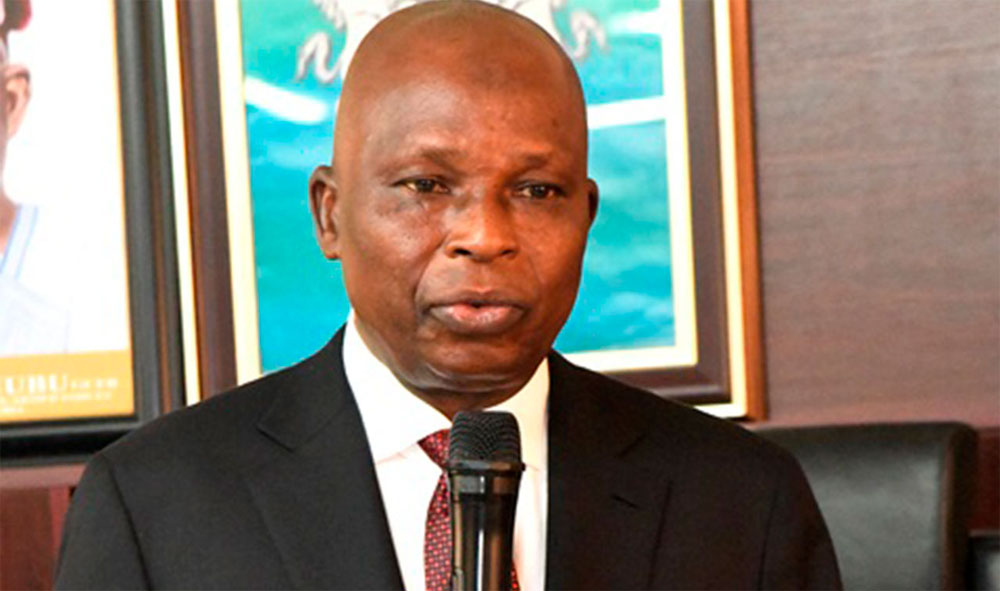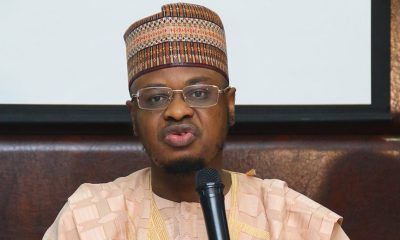“Now that the National Assembly is making a law to create additional states for the people of Southeast, it is reasonable, fair and timely to create additional local governments for Lagos State.”
News
Fish importation to end in 2022, says minister

The Federal Government has asked fish importers to consider producing fish locally as it plans to ban its importation in the next two years.
Minister of Agriculture and Rural Development, Sabo Nanono, said this on Monday in Abuja at the 35th Annual Conference of the Fisheries Society of Nigeria (FISON).
He said this was part of measures to prevent capital flight and implement programmes in the agriculture sector geared towards diversifying the economy.
The minister, who was represented by the Director of Federal Department of Fisheries, Mr Imeh Umoh, described fisheries as one of the value chains in the ministry.
“Let me inform you that the vision of Mr President is to grow Nigeria’s agriculture sector to achieve a hunger-free nation, through agriculture that drives income growth, accelerate the achievement of food and nutritional security, generate employment and transform Nigeria into a leading player in the group of food and fish markets, and to create wealth for millions,” he said.
The minister said currently, the total demand for fish was 3.6 million tonnes annually while Nigeria was producing 1.1 million tonnes, leaving a deficit of about 2.5 million tonnes to be supplemented by importation.
Nanono noted that an estimated over 12 million Nigerians were actively engaged in primary and fish production, adding that contribution of fisheries to the national Gross Domestic Products was about 4.5 per cent.
He said the government had directed all fish importers to go into backward integration for local consumption and export to international market as part of the measures of the ministry to reduce this importation and generate employment.
He said several companies had complied with the policy and that the ministry was optimistic that in the next two years, Nigeria would have no business with the importation of fish.
He said it is in this regard that the Federal Ministry of Agriculture and Rural Development was pursuing a holistic approach to the development of the fisheries subsector through the diversification programme along the value chain process.
“In line with the theme of this conference, the ministry has developed various programmes to increase domestic food/fish production and the main target is the empowerment of the youth and other groups especially the women,” he said.
He added, “All these programmes are tailored towards wealth and jobs creation, arrest and prevention of youth restiveness.”
Nanono added that the contributions of the fisheries and aquaculture sub-sector to the Nigerian economy and the ongoing economic recovery programme of the current regime were significant in terms of employment, income generation, poverty alleviation, foreign exchange earnings and provision of raw materials.
President of FISON, Mr Adegoke Agbabiaka, said in order to achieve self-sufficiency in food fish production, the government in the last decade had made a paradigm shift under the Agricultural Transformation Agenda and was considering agriculture, including fisheries, as a business.
News
Protest: Police combat ready, deploy 4,200 operatives to FCT strategic places

Protest: Police combat ready, deploy 4,200 operatives to FCT strategic places
The police say they are combat ready to crush any form of violence that may result from nationwide protests planned for next Thursday August 1 by some Nigerians against hardship and bad governance.
Indeed, starting with the Federal Capital Territory, Abuja, the police said it had deployed armed operatives to strategic locations.
The FCT Minister Nyesom Wike had earlier warned the organisers of the protest that Abuja would not be available for any rally or demonstration on August 1.
But a statement by Police Public Relations Officer, SP Josephine Adeh, in Abuja on Friday, said the FCT Command had deployed a total of 4,200 police officers to curb any form of violence that might arise from the protest.
The command was reacting in anticipation of the planned nationwide protest by some human rights activists and Nigerian youths, to publicly express their displeasure over hunger and hardship.
The planned protest has since generated massive traction on social media, especially on X.
According to Adeh, the command has proactively deployed material and human resources across the nooks and crannies of the nation’s capital.
The deployment, he said, was aimed at ensuring public safety, protecting protesters, and preventing protests from being hijacked by non-state actors.
The police command said the action was part of visibility policing, involving deployment of explosive ordinance devices (EOD) experts, and personnel at various strategic locations, raids on identified black spots, uncompleted buildings/shanties, stop and search, vehicular and foot patrol, and synergy with sister security agencies.
The Commissioner of Police FCT, Benneth Igweh, while acknowledging the right of residents to protest, advised that it should be peaceful.
He wrote, “The CP vows to resist all forms of violent protest and lawlessness, as the police will not be stampeded into allowing the destruction of public and private properties or loss of lives.
Residents are also advised to be vigilant and take advantage of the police emergency lines, to report suspicious activities through 08032003913, 08028940883, 08061581938, 07057337653 PCB: 09022222352, and CRU: 08107314192.
News
National Assembly urged to create more councils for Lagos

National Assembly urged to create more councils for Lagos
National Assembly has been urged to create more local governments for Lagos State, to meet its current population, social, economic and environmental challenges.
The Red Chamber is also advised to enact laws granting the state a special status for being the country’s commercial city and economic melting pot.
Renowned socio-political activist and critic, Chief Adesunbo Onitiri, made the demands in a statement in Lagos.
The activist recalled that in 1976 when the military government created states and local governments, Lagos and Kano states had 20 councils each.
“Later, Kano State councils increased to 44, while Lagos councils remained at 20. When the Abacha government carved out Jigawa State out of Kano State, Jigawa got 27 local governments, while Kano was still having 44 councils.
READ ALSO:
- Kano bakers summoned over bread price hike
- FG warns LG chairs misusing FAAC funds will face jail term
- PSG not giving up on Osimhen, seek further slash in price
“It is an injustice for Lagos State to remain with only 20 local governments till today, despite its gigantic social, security and economic problems,” Onitiri said.
He recalled that when the then Governor of Lagos State, now Nigeria’s President, Asiwaju Bola Ahmed Tinubu, created 37 additional councils in 1999, Chief Olusegun Obasanjo, then President, seized Lagos State federal allocations for two years.
He said Lagos State through the then Attorney-General, Prof. Yemi Osinbajo, sued the Federal Government, and the state government won the case against Federal Government at the Supreme Court.
He regretted that till now, National Assembly has not done the needful to enact a law to accommodate the 37 local governments created by Lagos State Government.
News
FG warns LG chairs misusing FAAC funds will face jail term

FG warns LG chairs misusing FAAC funds will face jail term
The Federal Government has threatened jail terms for Local Government Area chairmen who tamper with Federation Accounts Allocation Committee funds.
Lateef Fagbemi (SAN), the Attorney General of the Federation and Minister of Justice, made the announcement yesterday at the Human Rights Writers Association of Nigeria’s 17th annual lecture event in Abuja.
He stated that none of the chairmen have immunity and will be imprisoned if they tamper with funds designated for the development of their areas. Fagbemi stated, “We have a situation on our hands; I know that it is still there; the conduct of elections must be done by the states.”
“But the distinction is this: don’t forget, the governors have immunity, the local government council chairmen or councillors, they have no immunity, so they have to choose between dealing with the funds of the local government as they like and risking going to jail. The choice is theirs (LG chairmen).
“If they want to tamper with these funds and end up in jail, it is their choice. If they want to write their names in letters of gold, activities like construction or road upgrades must be returned to the local government. They don’t all have to come to Abuja.
READ ALSO:
- PSG not giving up on Osimhen, seek further slash in price
- Saudi duo to bid for Osimhen amid PSG stalled deal
- FG rolls out fresh plans to revive local manufacturing, create 4.4 million jobs
“If they stay at the local government, we will be able to reduce the level of insecurity that we have in Nigeria today. What obtains offshore is that the security agents are able to perform optimally because of information that comes to them from members of the public and usually it is from the grassroots.”
The minister said the federal government opted to use the supreme court to achieve local government autonomy due to the challenges it will face at state assemblies, stressing that any speaker who would have supported the cause will not survive the tenure or lose his reelection.
The Minister stated that for over two decades, local government administration in the country has been in comatose with state governments not remitting funds meant for the local governments.
Fagbemi, who urged security agents in the country to stop keeping suspects in detention beyond the period allowed by the constitution, added that detention without any court order will no longer be tolerated as appropriate sanctions will be applied to those found guilty of contravening the law of the land.
On his part, the National coordinator of HURIWA, Comrade Emmanuel Onwubiko, urged the federal government to cut down on the cost of governance.
He blamed corruption for the insecurity and high unemployment rate in the country, which is responsible for impending protests in the country.
FG warns LG chairs misusing FAAC funds will face jail term
-

 News2 days ago
News2 days agoNLC can’t withdraw from protest it didn’t organise – Ajaero
-

 News3 days ago
News3 days agoNorthern group attacks Reps Minority Caucus for demanding Nnamdi Kanu release
-

 International15 hours ago
International15 hours agoNetanyahu, Biden hold talks over tense Gaza ceasefire
-

 News2 days ago
News2 days agoFG unveils training programme for 1,000 Nigerians in AI, blockchain
-

 News2 days ago
News2 days agoMinimum wage: Akpabio says domestic workers can’t earn less than N70,000
-

 Africa3 days ago
Africa3 days agoDozens arrested in Uganda anti-government protests
-

 News3 days ago
News3 days agoDangote refinery: MAN cautions against demarketing local investments
-

 metro2 days ago
metro2 days agoWanted Lagos drug baron, Temo, arrested














You must be logged in to post a comment Login